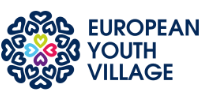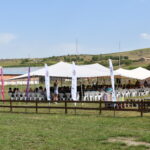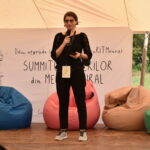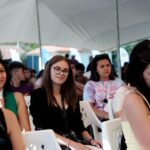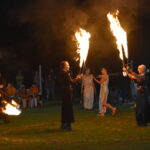The third edition of Rural Youth Summit was organized between 24th and 28th of August 2022, in the village of Ruși, commune of Slimnic (Sibiu), by the European Youth Village Governance (formed by Active Development Association ADA and Go Free – Association for Support of the Civil Society), in partnership with the Youth Initiative Group of Slimnic – European Youth Village 2022 and the Association „Knights of the Leaning Tower of Ruși”.
160 people attended this year’s edition of Rural Youth Summit, either as rural youth participants, youth workers, youth specialists or guests from local, county and national level public institutions.
The opening event of the Rural Youth Summit, third edition, was held on August 25th, in the schoolyard of Ruși (Slimnic commune), where the organizers set up a space to welcome all of the guests. The welcome message was addressed by Victor Cătălin Toma from Active Development Association, Andra Camelia Cordoș from Go Free Association, Mihai Panțiru from Association „Knights of the Leaning Tower of Ruși”, Adrian Nan, the mayor of Slimnic, Luca Marcel Constantin, vice-president of the Sibiu County Council and Ciprian Ciocan, chief executive officer at Sibiu Community Foundation.
„Rural Youth Talks – motivational conference” brought once again to stage 5 young people living in rural areas, of different ethnicities – Romanian, Hungarian and Roma – to share their brave stories to the welcoming audience. Their names are listed as follows: Iulia Tăvală – member of the Youth Initiative Group of Slimnic (Sibiu), Luminița Rostaș – PhD student, passionate about technology, from the village of Hădăreni (Mureș), Nandor Hunor Kovacs – member of the Youth Initiative Group of Ciucsângeorgiu (Harghita), Anamaria Simerea – volunteer at Go Free, member of the European Youth Village programme, from village of Runcu (Gorj), Alexandra Popescu – member of the Youth Initiative Group of Scoarța (Gorj). The speeches will soon be published on the social platforms of the European Youth Village programme.
„My name is Luminița, I am from Hădăreni village, in Mureș county, but I am an adopted child of Cluj-Napoca. I am currently a PhD student at the Technical University of Cluj-Napoca, on the topic of Artificial Intelligence. I am almost 25 years old, and I always wanted to become a teacher. My parents left abroad when I was around 7-8 years old, therefore my brother and I were raised by our grandparents. I can’t say that we didn’t lack things, both materially and emotionally, but we were fortunate to have amazing grandparents who tried to keep all of this out of sight. My grandmother used to say that <<without school you’re getting nowhere>> so I focused on studying. I wanted to be the best in my class, sometimes I succeeded, sometimes not. For example, I am a Roma person, I was supposed to get the 3rd prize when I was in 4th grade at school. But my teacher considered that the prize wasn’t for me, and it should be claimed by a Romanian girl – we used to study and do our homework together at my place. That was the first time when I felt discriminated against, but I got over it – I was relieved that in 5th grade I no longer had that teacher in front of the class. Years went by and I got to high school, which was a new world for me, as I came from a small village. The transition wasn’t easy, besides that there was a mathematics and computer science school profile. I wanted to give up, I didn’t have the confidence that I could pass, and I thought about getting transferred to another profile. I was crying with my grandma next to me, she was the one to encourage me to carry on. I made it to the International Romani Language Olympiad, I won a prize there, which secured my place at college, and that made me very happy. […] (Excerpt from Luminița’s speech – Rural Youth Talks)
- Iulia
- Luminița
- Nandor
- Anamaria
- Alexandra
„My name is Alexandra Popescu, I come from Scoarța village. Had we met 2 years ago, you would’ve had no idea I live in a village because I was ashamed to say that. This inferiority level I felt for living in the countryside came because of the school environment I was in. And that’s why I will use this opportunity to share my experience in the Romanian education system as a rural student. My parents enrolled me in the kindergarten in Scoarța because it was close to home. The staff was insufficient for the number of children enrolled there, and I quite often took advantage of their lack of attention and returned home by myself. The problem was that I was crossing a national road, being only 3 years old. Because of this, my parents transferred me to the kindergarten of Târgu Jiu, the town nearby, where I continued my educational path. In primary school, I was struck by the artificial manner in which excellence, a hot topic lately, was promoted. Being a student at a prestigious school, we had to have very good results that were achievable only through competitiveness. And this wasn’t just about the answers we gave in the class, the grades we had or our results in school competitions, it was also a context for discriminatory attitudes. Appearance, the parents’ economic situations or backgrounds, all of these were grounds for jokes, bullying and even physical abuse. Things changed later, when I got to high school, and since I got to know about the European Youth Village programme, I started to be proud about the environment I come from, to promote it in every meeting that I have with other young people in the country and to get actively involved in the existent problems. By trying to have access to quality education, the parents bring their children to urban educational institutions, but this is not the way to solve the problem. Those rural students are still not fully accepted by their peers and are totally disconnected from their community. We need to invest the necessary resources in rural schools and teacher training to minimize the differences that still exist. More than that, it is important to focus on the needs of young people and give them the confidence that things can get better. All of us here know how diverse the problems we face are when it comes to accessing education, needless to mention the transportation or scholarships for students. […] (Excerpt from Alexandra’s speech – Rural Youth Talks)
Throughout the three days of activity, the young people participated in 22 thematic workshops, carried out in different sessions, which aimed to develop the participants’ knowledge and skills and to empower them to engage in their communities, as well as the plenary sessions that focused on improving youth policies that directly target rural youth:
Birds and bees – Basics in the reproductive education, facilitated by Voichița Slevoacă (Semper Musica Association)
Romani Language and identity discovery, facilitated by Luminița Rostaș
Rural Youth involved for green and clean communities, facilitated by Andreea Petruț (Act for Tomorrow Association)
Get a taste for participation, development opportunities for youth, Erasmus+ Youth Mobilities, facilitated by Florina Făgărășeanu (National Agency for Community Programmes in Education and Vocational Training – ANPCDEFP)
Socio-educational animation, facilitated by Elena Lupoaea-Petrea (National Organization of Romanian Scouts)
Treasure hunt in my village, facilitated by Larisa Panțiru & Iulia Tăvală („Knights of the Leaning Tower of Ruși” Association)
About safe spaces, facilitated by Andre Rădulescu & Alex Meszaros (Identity.Education Association)
Human rights – where to? – facilitated by Cătălina Olteanu (National Council for Combating Discrimination)
Lobby and advocacy – the art of influencing public decision-making in the interest of youth, facilitated by Mircea Meriacri (the Federation of Youth NGOs Iași – FONTIS)
Solidarity in the Community, facilitated by Andrei Popescu (ANPCDEFP and European Solidarity Corps)
Youth centers, spaces with and for young people, facilitated by Mihai Vilcea (Youth Foundation of Timiș County – FITT)
Youth Opportunities, facilitated by Nicușor Ciobanu (ANPCDEFP and European Solidarity Corps)
How does the ministry of youth work? – facilitated by Lelia Preoteasa (Ministry of Family, Youth and Equal Opportunities)
Street Debate: Dialog #înRitmRural, facilitated by Simona Militaru (Go Free – Association for Support of the Civil Society)
Personal Development through Theater Techniques, facilitated by Ionuț Șerban
(Un)healthy relationships, facilitated by Monica Barbovschi & Ana Tamaș (Association Active Citizens for Ethical Relations – CARE)
About Art, facilitated by the artist George Roșu
The essence of community – The story of stone soup, facilitated by the music therapist Jean Baptiste Odobestianu (Manitou)
It is the European Year of Youth. What do we do with it? – facilitated by Andrei Popescu (ANPCDEFP and European Solidarity Corps)
The role of your local authorities, facilitated by Ologu Șutei Florin Sebastian (Active Development Association – ADA)
Journalism for the community, facilitated by Alexandra Maria Sandu (Go Free – Association for Support of the Civil Society)
Dance with ELITE CREW, facilitated by Neculăeș Emma, Pleșca Eli, Clopoțel Sorana, Frenț Delia, Andro Alex from Hălăucești – European Youth Village 2022

The Youth Initiative Groups from the 9 candidate villages for the title of European Youth Village 2023 presented their applications to the EYV jury in a special session at the Rural Youth Summit, on August 26th. In alphabetical order, the young people briefly presented their community’s youth issues, activity plans, answered the jury’s questions and received feedback from them: Ciucsângeorgiu commune from Harghita county; Dumbrava commune from Prahova county; Matca from Galați county; Panaci from Suceava county; Popești from Bihor county; Racovița from Sibiu county; Scoarța from Gorj county; Săbăoani from Neamt county; Tulucești from Galați county. The Youth Initiative Groups from these villages will submit the final application by October 10th, which will be evaluated by each member of the jury. Finally, the title European Youth Village 2023 will be awarded at the Rural Youth Gala in November 2022.
The jury members who attended the presentations held by the Youth Initiative Groups were: Andra Camelia Cordoș (Go Free Association); Andre Rădulescu (Identity.Education Association); Andrei Popescu (National Agency for Community Programmes in Education and Vocational Training); Cătălina Olteanu (National Council for Combating Discrimination); Lelia Preoteasa (Ministry of Family, Youth and Equal Opportunities); Mihai Panțiru (Slimnic – European Youth Village 2021– 2022); Victor Cătălin Toma (Active Development Association & European Youth Village); Yolanda Florescu (Youth Foundation of Timiș County), and via Zoom: Maria Bivol (Association Alternativa – Republic of Moldova) and Vlad Dumitrescu (Civil Society Development Foundation).
The title of „European Youth Village” is offered to the villages or communes that support the young people in the actions organized in the community and understand that change on a local level is generated through a partnership between local authorities and youth. Throughout 2023, all the initiatives, events or actions organized locally in the communes that hold this title will aim to raise the participation of young people and authorities in order to solve problems or needs that the rural youth has, but also to improve some aspects that are directly targeting the young people from rural areas. By participating in the programme, the young people become more aware of the resources they have, more visible and prepared for action on the way to the real change they wish for locally, nationally, and on European level.
At the same time with the candidates’ presentation, a treasure hunt through the village of Ruși was organized by the volunteers of the Youth Initiative Group of Slimic – European Youth Village 2022, for the rest of the participants.
On the third day, August 27th, we officially launched the White Charter for Rural Youth, the first strategic document designed to act as a guide for the future public policies that have effects on rural youth. The panel was attended by the following guests (in the order of the interventions): Victor-Cătălin Toma and Andra Camelia Cordoș (Coordinators of the European Youth Village programme); Izabella Doboly (State Secretary at the Ministry of Family, Youth and Equal Opportunities); Raluca Turcan (Chamber of Deputies, Committee on Labour and Social Protection); Valentin-Dumitru-Ioan Ivan (Vice–president of the Romanian Communes); Mircea Meriacri (Representative of the Romanian Youth Council); Yolanda Florescu (Representative of the Youth Foundation of Timiș County); Andrei Popescu (ANPCDEFP, Erasmus+ and European Solidarity Corps).
The panel was followed by two other workshop sessions. After the official closing of the 3rd edition of Rural Youth Summit, the evaluation #înRITMRural, another photo session in the photobooth area and a street debate on the topic „What does the European Youth Village look like?”, the evening was closed by a fire show performed by the Knights of the Red Fortress of Sibiu, fireworks, and a party to celebrate together our participation and the new friendships.
At the end of this year’s Rural Youth Summit, our thanks go to all those who made this event possible in the village: to the Slimnic, ADA and Go Free volunteers, facilitators, representatives of the authorities, members of the jury, but also to the people who supported us into transforming the school spaces into a welcoming, friendly environment, and to the ones who took care of us during these days and responded to our requests. Our thanks also go to the participants who understood that it takes patience to upgrade participation! We don’t forget the coordination team of this event either: Andra, Leo, Mihai, Miruna and Victor.
The Rural Youth Summit is an event coordinated by the Governance of the European Youth Village programme (Active Development Association and Go Free – Association for Support of the Civil Society) within the project “European Youth Village – a reference programme for the development of rural youth sector”.
Project implemented by the Active Development Association and Go Free – Association for Support of the Civil Society, with the financial support of Active Citizens Fund Romania, a programme funded by Iceland, Liechtenstein and Norway through EEA Grants 2014-2021. The aim of the project is to strengthen the capacity of the European Youth Village programme to become a reference programme for the development of the rural youth sector and to strategically contribute to systemic changes that support young people and the whole rural youth ecosystem in Romania by coalescing the sector, influencing and monitoring public policies and diversifying opportunities, resources and support tools for organizations and young people.
You will often see on the European Youth Village social platforms and in articles the hashtag #înRITMRural. In English, it means „in rural rhythm”, but in Romanian it is more than that. #înRITMRural is a reference to the Rural Youth Informal Network, another component of the European Youth Village programme that aims to represent the needs of rural youth. We will soon open the call to registrations in the network, which will be followed by the selection of regional coordinators and members from rural youth, for each development region of the country.
This is a translation of an article published by Andra Camelia Cordoș, available online here. Translation made by Miruna Lupaș.
